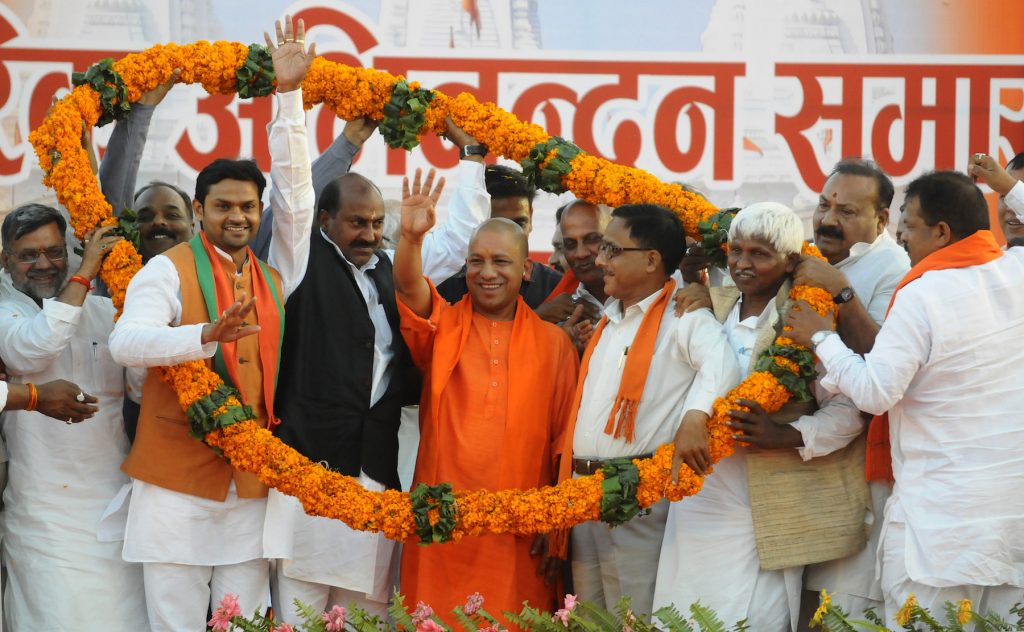You’ve been at work since 9am. The clock hits 4.45 (not that you were watching or anything). You’ve had your 3 o’clock snack and your sixth cup of tea. Just fifteen more minutes.
Imagine you had another 10 hours left of work to do. Every single day.
For some government workers in India, that could become a reality – the new chief minister in the Indian state of Uttar Pradesh, Yogi Adityanath, said in a speech on Sunday that government workers must work 18-20 hours a day until the policies he promised are put into place, or they should quit their jobs.
Argfgrdgs! 18-20 hours? Is that even possible?
This is what he said: “The state government will not tolerate any laxity in implementation of the government schemes. Officers who are willing to work 18-20 hours daily can continue with the government or else they are free to leave.”
Adityanath has just been elected, he’s got some pretty strong new policies that he thinks are going to make the state of Uttar Pradesh a better place for the people who live in it, and he thinks people working for the government should work themselves to the bone to make sure those people get the benefit of his proposals. No slacking. But 18-20 hours? Holy moly.
If these government workers work in an office, that’s being at their desks from like 6am - midnight. Not including time for lunch – for a break even.
OK, so it’s physically possible. But it’s not normal right?
According to this response on Quora – government jobs in India have pretty standard official working hours of 9.30-6, Monday - Friday, but workers are expected to be on call 24 hours a day.
Official working hours can often differ pretty heavily from the hours actually spent at your desk. A petition launched last week argued that most Indian companies are expecting their employees to work anything up to 12 hour days regularly, and called on the government to block employers from allowing their workers from working more than 8.5 hours a day.
A UK survey by a recruitment firm Morgan McKinley found that 73% of the people who replied said they were working more than their contracted hours. Three-quarters of these said that these extra working hours are having an impact on their work-life balance and two-thirds of respondents felt like they had to work more than their contracted hours.
In Uttar Pradesh, the minister said he expects his staff to work as hard as he does. “I am a workaholic and the bureaucrats will have to deliver too. Those who are ready to work hard should continue and non-performers should leave,” he said. That's is something a lot of people around the world will recognise – showing you're boss that you're prepared to stay late is like showing them you can work hard, right?
For lots of people, especially at the start of their careers, it often feels like how early you get in and how late you stay is more important than the work you actually do. It’s being called a culture of ‘presenteeism’ – workers are expected to always be there, and if they can't be there then they should be on there phone or responding to emails whatever the time.
Surely it can't be good for you?
There's quite a lot of research about the impact this culture of long hours has – not only on the workers themselves, but also on the company.
In fact, it's been argued that the culture of presenteeism (or working long hours) doesn't actually benefit the company at all. If you think about those Indian government workers, sat at their desk from 6am-midnight, can they really be doing a good job consistently that whole time?
A Boston university study found that there was no evidence to suggest that people who put in more hours actually got more done. Another study showed that it impacted the company's attendance rates (people were more likely to phone in sick, for example).
But it also found that there were really negative effects on individual employees. People who worked really long hours were more likely to sufffer from mental health problems like anxiety, depression, stress – to name just a few.
Sometimes when you do something you really care about, putting every second of your time into it might seem like the only way to get results. Adityanath obviously wants to show how committed he is to his policies, and thinks his workers should be too. But maybe he should have a rethink – 18-20 hours a day is a hell of a lot.

